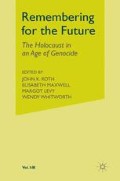Abstract
The year 2000 ushers in a new century and new millennium; it also marks the eighty-fifth anniversary of the Armenian Genocide. That calamity completely altered the course of Armenian history as well as the geopolitical, economic, and ethnographic complexion of the Middle East. At this particular threshold of time, the Armenian Genocide, like the Holocaust and the genocidal massacres in Africa, Southeast Asia, the Balkans, and elsewhere, now belong to a past century and in the minds of many may not seem to have much significance for current generations. Yet the lessons from those crimes remain compelling and need to be passed on. In the Armenian case, more than anything else, it is the trauma that is especially enduring because of the refusal of the perpetrator regime or its successors to acknowledge the crime and to seek redemption. Instead of apologies and educational programmes to face their history and themselves honestly, the Turkish government and most Turkish intellectuals continue along a path of self-righteous negation. In this dissimilation they are joined by sympathetic academics abroad, thereby only compounding the trauma of the victims. In fact, the case of the Armenian Genocide has become the prototype of denial of modern premeditated mass killing, with particular relevance to negation of the Holocaust. It is not coincidental that, the Holocaust excepted, there has been no admission of responsibility by any genocidal regime in the 20th century.
Preview
Unable to display preview. Download preview PDF.
Notes
See Richard G. Hovannisian, ‘The Armenian Genocide and Patterns of Denial’, in The Armenian Genocide in Perspective, ed. R.G. Hovannisian (New Brunswick, NJ, and Oxford: Transaction Books, 1986), pp. 111–34.
For bibliographic essays on this subject, see Roger W. Smith, ‘Denial of the Armenian Genocide’, in Genocide: A Critical Bibliographic Review, ed. Israel W. Charny, vol.2 (London: Mansell, and New York: Facts on File, 1991), pp.38–62, 63–85.
See also Deborah E. Lipstadt, Denying the Holocaust: The Growing Assault on Truth and Memory (New York: The Free Press, and Toronto: Maxwell MacMillan, 1993).
See, for example, Clive Foss, ‘The Turkish View of Armenian History: A Vanishing Nation’, in The Armenian Genocide: History, Politics, Ethics, ed. Richard G. Hovannisian (New York: St. Martin’s Press, and London: MacMillan, 1992), pp.250–79.
Kamuran Gürün, The Armenian File: The Myth of Innocence Exposed (New York: St. Martin’s Press, 1985), p.36.
Justin McCarthy and Carolyn McCarthy, Turks and Armenians: A Manual on the Armenian Question (Washington, DC: Assembly of Turkish American Associations, 1989), pp.85–86.
Altemur Kiliç, Turkey and the World (Washington, DC: Public Affairs Press, 1959), p.18.
Bernard Lewis, The Emergence of Modern Turkey (London, New York, Toronto: Oxford University Press, 1961), p.350.
Stanford J. Shaw, History of the Ottoman Empire and Modern Turkey, vol.2, co-authored with Ezel Kural Shaw, Reform, Revolution and Republic: The Rise of Modern Turkey, 1808–1975 (Cambridge, London, New York, Melbourne: Cambridge University Press, 1977), p.315.
Turkey, Prime Ministry, Armenian Atrocities in the Caucasus and Anatolia According to Archival Documents (Ankara: Prime Ministry State Archives, 1995), introduction.
See Vahakn N. Dadrian, The History of the Armenian Genocide (Providence and Oxford: Berghahn Books, 1995), pp.303–43. See also Dadrian’s bibliographic essay, ‘Documentation of the Armenian Genocide in Turkish Sources’, in Charny (1991), pp.86–138.
Lewis V. Thomas and Richard N. Frye, The United States and Turkey and Iran (Cambridge, MA: Harvard University Press, 1951), pp.60–61.
New York Times and Washington Post, 19 May 1985. On the role of Heath Lowry and the Institute of Turkish Studies, see Roger W. Smith, Eric Markusen, and Robert Jay Lifton, ‘Professional Ethics and the Denial of the Armenian Genocide’, Holocaust and Genocide Studies, 9:1, 1995: 1–22.
See Richard G. Hovannisian, ‘The Armenian Diaspora and the Narrative of Power’, in Diasporas in World Politics, ed. Dimitri C. Constas and Athanassios G. Platias (London: MacMillan, 1993), pp. 192–97. For the Congressional debate in 1990, see 101st Congress, 2d sess., Congressional Record, 136 (Washington, DC: Government Printing Office, 1990), pp. 1208–36, 1312–57, 1416–88, 1692–1716, 1731–32.
See the detailed account of conference organizer Israel W. Charny, ‘The Conference Crisis: The Turks, Armenians and Jews’, in The Book of the International Conference on the Holocaust and Genocide, vol.2: The Conference Program and Crisis (Tel Aviv: Institute of the International Conference on the Holocaust and Genocide, 1983), pp.270–330.
Steven T. Katz, The Holocaust in Historical Context, vol.1: The Holocaust and Mass Death before the Modern Age (New York and Oxford: Oxford University Press, 1994), p.22.
William Spencer, ed., The Middle East, in the Global Studies series, 7th edn. (Guilford, CT: Dushkin/McGraw-Hill, 1997), pp.129, 144–45.
Yehuda Bauer, ‘Is the Holocaust Explicable?’ Remembering for the Future: The Impact of the Holocaust and Genocide on Jews and Christians, vol.2 (Oxford: Pergamon Press, 1983), p. 1970.
Editor information
Copyright information
© 2001 Palgrave Macmillan, a division of Macmillan Publishers Limited
About this chapter
Cite this chapter
Hovannisian, R.G. (2001). Denial. In: Roth, J.K., Maxwell, E., Levy, M., Whitworth, W. (eds) Remembering for the Future. Palgrave Macmillan, London. https://doi.org/10.1007/978-1-349-66019-3_51
Download citation
DOI: https://doi.org/10.1007/978-1-349-66019-3_51
Publisher Name: Palgrave Macmillan, London
Print ISBN: 978-0-333-80486-5
Online ISBN: 978-1-349-66019-3
eBook Packages: Palgrave History CollectionHistory (R0)

